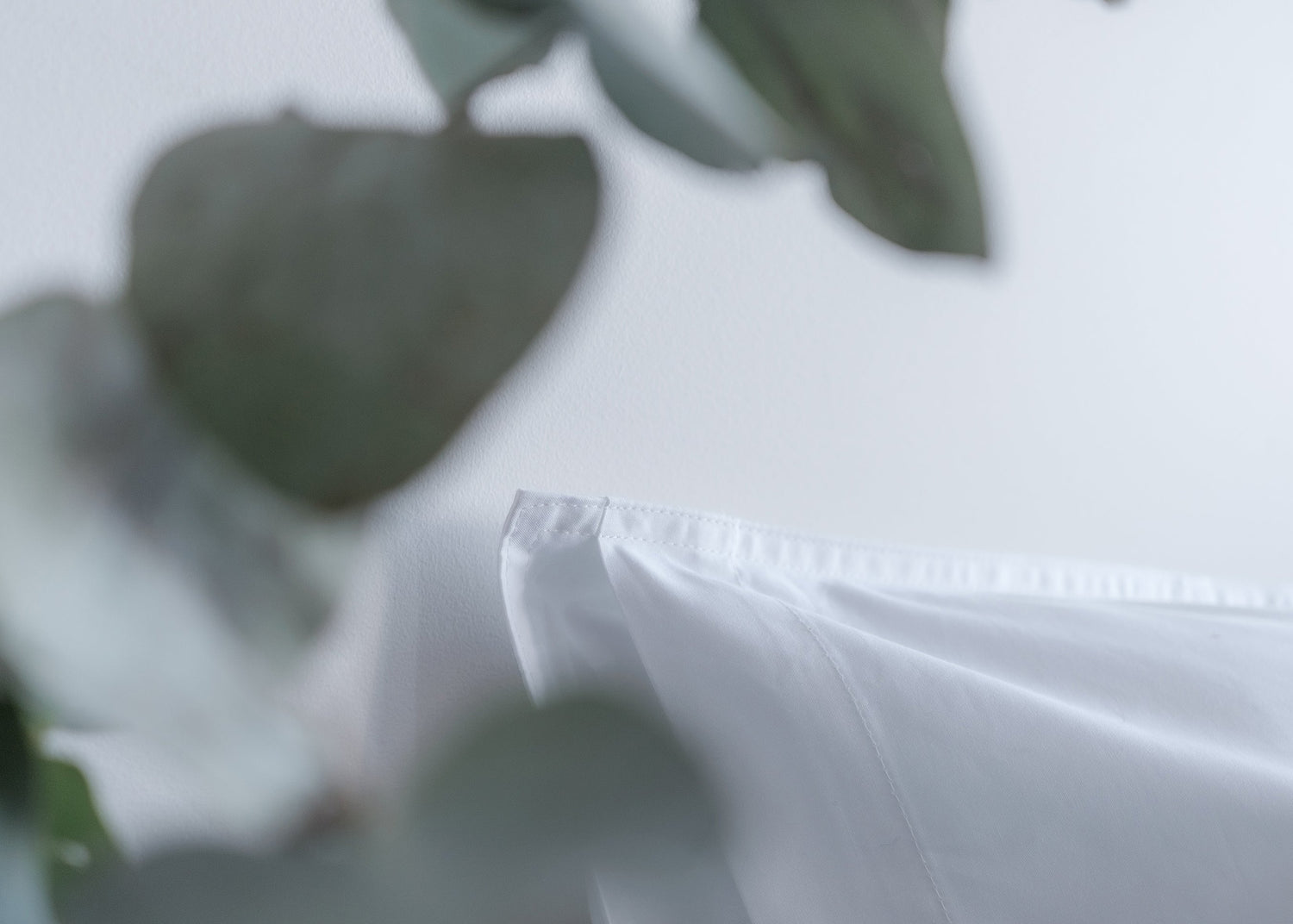
Which Protector Materials to Choose: Tencel, Bamboo/Cotton, or Polyurethane?
Share
Choosing a mattress or pillow protector is like picking out the perfect wingman (or wingwoman) for your bed. You want someone (or something) who’s reliable, keeps things cool, and has your back (literally) when life gets messy. But with so many options out there—Tencel, bamboo/cotton blends, polyurethane, and more—it’s easy to get overwhelmed. Fear not, because we’re here to help you sort through these superstar materials and find the perfect protector for your bedding.
Whether you’re looking for something soft and sustainable, breathable and cool, or waterproof and durable, there’s a protector material that fits your needs and eco-friendly values. Let’s dive into the fabulous world of protector materials and help you decide which one is best for your bedroom!
Why Mattress and Pillow Protectors Matter
First things first—why should you even care about mattress and pillow protectors? You might think, "I’ve got sheets, I’m good to go." But protectors do so much more than just add an extra layer between you and your mattress. These undercover heroes shield your mattress and pillows from spills, stains, dust mites, sweat, and allergens, all while prolonging their life. And if you’re serious about making your bed a clean, comfortable, and eco-friendly haven, picking the right protector material is key.
Now, let’s break down the three materials you’re most likely to encounter when shopping for top-tier mattress and pillow protectors: Tencel, bamboo/cotton blends, and polyurethane.
1. Tencel: The Silky, Sustainable Sleeper
If you’re looking for a material that’s luxuriously soft, breathable, and eco-friendly, Tencel should be at the top of your list. Made from sustainably sourced wood pulp (usually from eucalyptus trees), Tencel is a plant-based fibre that has quickly become a favourite in the world of sustainable bedding.
Why You’ll Love Tencel:
- Super Soft: Tencel has a silky, smooth texture that feels amazing against your skin. It’s perfect if you want your bed to feel like a five-star hotel but without the environmental guilt.
- Moisture-Wicking: Tencel naturally absorbs moisture (we’re talking sweat, people) and wicks it away, keeping you cool and dry throughout the night. It’s especially great for hot sleepers or anyone who lives in a warm climate.
- Hypoallergenic: If you’ve got sensitive skin or allergies, Tencel is naturally hypoallergenic. It’s super gentle and doesn’t irritate, making it a great option if you want a clean, non-toxic sleep environment.
- Eco-Friendly: Tencel is made using a closed-loop process that recycles almost all the water and solvents used in its production. This means it’s a seriously sustainable option. Plus, eucalyptus trees grow quickly and don’t require a ton of water or pesticides, so you can sleep easy knowing you’re not harming the planet.
Potential Downsides:
- Price: Tencel tends to be a bit pricier than other materials, but you’re paying for high-quality comfort and sustainability. It’s an investment that your skin (and the planet) will thank you for.
2. Bamboo/Cotton Blends: The Cool and Cozy Combo
Next up is the bamboo/cotton blend, a dynamic duo of two of the most popular natural fibres in the eco-bedding world. Bamboo is known for its cooling properties and sustainability, while cotton (especially organic cotton) adds breathability, softness, and durability to the mix. When combined, these two fibres create a material that’s both cozy and cool—a perfect balance for your bedding.
Why You’ll Love Bamboo/Cotton Blends:
- Naturally Cooling: Bamboo is naturally cooling and moisture-wicking, making bamboo/cotton blends a dream come true for hot sleepers. The breathable nature of cotton also helps promote airflow, ensuring you stay cool throughout the night.
- Soft and Durable: Organic cotton brings softness and durability to the blend, while bamboo adds a silky touch. Together, they create a protector that feels soft and comfortable while being strong enough to last through countless washes.
- Antimicrobial Properties: Bamboo has natural antimicrobial and antibacterial properties, which means your protector can help keep your bed fresh and free from odours. That’s a big win for anyone who’s worried about allergens, dust mites, or just keeping things super clean.
- Eco-Friendly: Both bamboo and organic cotton are sustainable crops that require fewer pesticides and water than traditional cotton farming. Bamboo, in particular, grows like a weed (but in a good way), making it one of the most renewable resources around.
Potential Downsides:
- Wrinkling: Bamboo/cotton blends, like any natural fibre, can wrinkle a bit more than synthetic options. But hey, those wrinkles are a small price to pay for the natural luxury and sustainability they bring to your bed!
3. Polyurethane: The Waterproof Wonder
Now, let’s talk about the superhero of waterproof protection—polyurethane. Polyurethane is a flexible, durable polymer that is commonly used as a waterproof layer in mattress and pillow protectors. It’s perfect if you’re looking for total spill protection without sacrificing breathability or comfort.
Why You’ll Love Polyurethane:
- Waterproof: Polyurethane protectors are 100% waterproof, making them ideal for families with kids, pets, or anyone who enjoys breakfast in bed (hey, no judgment!). They’ll keep your mattress safe from spills, accidents, and stains without letting anything soak through.
- Breathable: Unlike some other waterproof materials (looking at you, PVC), polyurethane is breathable. This means it won’t trap heat and moisture like plastic-based protectors. Instead, it allows air to flow through, keeping you cool and comfortable.
- Soft and Silent: Polyurethane protectors are soft and flexible, so you won’t get that crinkly, plastic feeling that comes with cheaper waterproof protectors. You’ll barely notice it’s there, and it won’t make any noise when you move around at night.
- Durable: Polyurethane is highly durable and long-lasting, so you won’t need to replace your protector anytime soon. It’s an investment that’ll protect your mattress for years to come.
Potential Downsides:
- Not a Natural Fibre: Polyurethane isn’t a natural material like Tencel or cotton, but it’s still a far cry from the toxic plastic materials like PVC. If you’re looking for a completely natural protector, you might want to stick with Tencel or bamboo/cotton blends for their eco-friendliness.
Which Protector Material Is Right for You?
So, which material should you choose? The answer depends on your needs, your budget, and your personal values when it comes to comfort and sustainability. Here’s a quick breakdown to help you decide:
- Go for Tencel if you want a silky-smooth, eco-friendly protector that’s ultra-breathable, hypoallergenic, and luxurious. It’s perfect for sensitive skin and hot sleepers who want to feel pampered in bed.
- Choose Bamboo/Cotton Blends if you want the best of both worlds—natural cooling properties and a soft, durable protector. It’s ideal for eco-conscious sleepers who want something cozy, sustainable, and naturally antimicrobial.
- Pick Polyurethane if waterproofing is your top priority. If you’re prone to spills, have little ones or pets sharing your bed, or simply want peace of mind, polyurethane is the way to go. It’s soft, breathable, and will keep your mattress safe from life’s little accidents.
Final Thoughts: Protect Your Bed, Protect the Planet
At ecolinen, we believe that choosing the right protector material is about more than just keeping your mattress safe—it’s about choosing comfort, sustainability, and eco-friendly options that support a healthier planet. Whether you go for the luxurious softness of Tencel, the cooling comfort of bamboo/cotton blends, or the waterproof protection of polyurethane, you can rest easy knowing you’ve made a choice that’s good for you and the environment.
Ready to find the perfect protector for your bed? Explore ecolinen’s range of eco-friendly mattress and pillow protectors, and transform your sleep space into the ultimate, green sanctuary. After all, your bed deserves the best—so why not treat it to something truly special?

